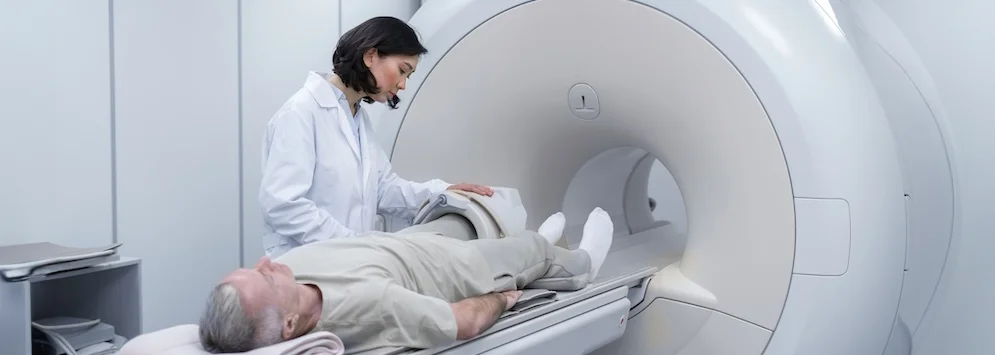
Magnetic Resonance Imaging (MRI) is a sophisticated diagnostic tool that uses magnetic fields and radio waves are used to create images of certain parts of the body from a wide variety of angles. MRI has many benefits, such as its non-usage of X-rays, painlessness, non-invasive yet powerful and sensitive. It also currently does not have any known side or aftereffects and can even be used to both diagnose and evaluate various soft tissue related medical conditions.
An MRI scan involves lying down on a motorised bed that slides into a large tube containing powerful magnets (MRI Scanner). The scan usually lasts between 30 to 60 minutes depending on the area being examined.
Wear comfortable, loose-fitting clothing to prepare for an MRI and remove all metal objects. You may be asked to change into a hospital gown. Avoid caffeine and heavy meals before the scan if it involves your abdominal area.
An MRI scan, or Magnetic Resonance Imaging, utilises advanced technology to produce detailed images of the internal structures of your body. This non-invasive diagnostic tool is crucial for medical professionals to assess various conditions effectively.
During an MRI scan, you will be lying within a powerful magnetic field that causes the protons in your body to align uniformly, much like how a magnet influences a compass needle. This alignment is painless and undetectable to the patient.
The MRI machine emits short bursts of radio waves targeting specific body areas, temporarily disrupting the proton alignment. When the radio waves cease, the protons return to their original alignment. This realignment process emits signals captured by the MRI’s sensors.
The signals emitted by the realigning protons vary depending on the tissue type. Different tissues cause protons to realign at different speeds, producing unique signals. These signals are then compiled to generate a precise and detailed image of your body’s interior, similar to how pixels form an image on a computer screen.
The resulting images from an MRI scan provide unparalleled detail that helps distinguish between healthy and abnormal tissue, making it an invaluable tool for diagnosing a range of conditions, from injuries to tumours.
After your MRI scan, gradually rise from the scanner table to prevent dizziness. If sedatives were administered, avoid driving and limit activities until they wear off.
Monitor for any reactions if contrast dye is used, especially symptoms like itching, swelling, or difficulty breathing, and contact your doctor immediately for any severe reactions. Typically, no special care is needed post-scan, and you can resume usual activities unless advised otherwise by your healthcare provider.
For issues concerning soft tissues of the body like the heart, lungs, liver and other organs, MRI scans are recommended as they are able to capture images where X-rays cannot. This can help the radiologist evaluate the structure and function of your organs to diagnose your condition.
MRI scans can diagnose and evaluate conditions such as brain aneurysms or brain tumours and even provide a diagnosis of what type of brain lesions may be.
For patients who might have suffered a stroke, an MRI scan can determine the location of the blockage or bleeding that may have caused the stroke and can also be used to review any structural causes of epilepsy.
MRI scans provide a safer and non-invasive alternative to X-ray angiography as well for the diagnosis of heart and brain related diseases, soft tissue injuries, joints and spine conditions. The scan also helps plan and prepare our surgeons for certain procedures such as awake craniotomy (brain lesion removal) and deep brain stimulation.
Your goal of getting swift, accurate and effective treatment is our strength. The skilled team of radiologists and staff at Gleneagles Hospitals is committed to placing your needs at the heart of all we do.
Take your first step towards better health today and experience the high-quality, customised healthcare that has been our legacy for more than 50 years. Contact us today to schedule your MRI scan.

Wait a minute